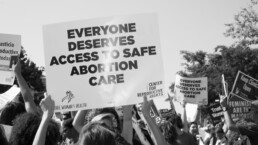The anti-abortion movement has gained considerable footing in the Midwest, creating a devastating atmosphere for Midwesterners and others traveling to the region for care.
by Tina Vásquez, Prism
Alison Dreith has spent years of her life fighting for abortion rights in a region of the country where attacks on bodily autonomy are the norm, not the exception. As the Midwest Access Coalition’s (MAC) director of strategic partnerships, she’s helped hundreds of people maneuver through the increasingly complicated process of accessing abortion care. Since Roe was overturned last year, the abortion fund’s net of support has expanded further across the country. MAC now helps a large population of Southerners access care in Illinois, an outlier in the Midwest that allows abortions to take place until the time a fetus can exist outside of the womb, around 24 to 26 weeks gestation.

For the last three years, Dreith has also worked part-time for Women’s Health Specialists of California, a small clinic nestled in California’s Sierra Nevada mountains. Dreith told Prism the clinic has recently seen multiple patients from Texas. This is part of a larger, nationwide trend. When Roe was overturned, it created a dangerous domino effect: More abortion bans and restrictions meant fewer clinics providing care. Fewer clinics providing care meant clinic wait times got longer. Those living in states with six or 12-week bans do not have weeks to wait for a clinic appointment.
Recent Posts
‘Unconstitutional. Unethical. Authoritarian.’ ICE Bars Millions Of Immigrants From Bond Hearings
July 18, 2025
Take Action Now One watchdog said the new policy “seems like a blatant attempt to stop them from exercising their right to due process.”……
Americans Are Not Nearly Alarmed Enough About Climate Change
July 18, 2025
Take Action Now Americans still don’t comprehend how imminent, dangerous, and far-reaching the threat is—and journalists are partly to blame.By…
The IRS Is Building A Vast System To Share Millions Of Taxpayers’ Data With ICE
July 17, 2025
Take Action Now ProPublica has obtained the blueprint for the Trump administration’s unprecedented plan to turn over IRS records to Homeland Security…
Israel’s Sudden Assault On Syria Is Unchecked Aggression
July 17, 2025
Take Action Now Jerusalem is bombing Damascus and threatening al-Sharaa’s rule, while Washington was hoping to help the nascent government on…




